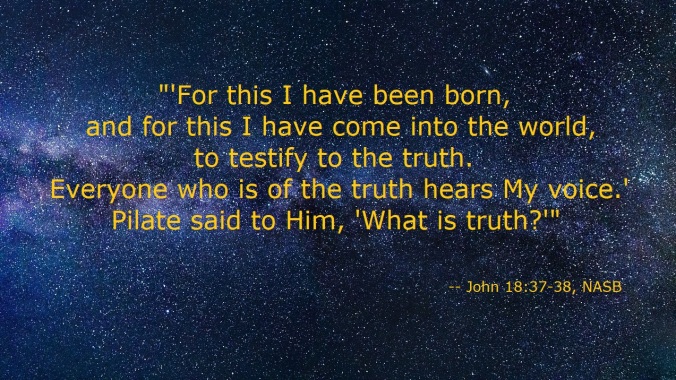“Go therefore and make disciples of all the nations…teaching them to observe all that I commanded you; and lo, I am with you always, even to the end of the age” (Matthew 28:19-20, NASB).
——————–
Contents:
1) Truth (Frank Himmel)
2) Learning From Jesus (Wayne Goff)
3) A Bible Syllogism (Tom Edwards)
——————–

-1-
Truth
Frank Himmel
Jesus had much to say about truth. Consider these references from the gospel of John.
Truth originates with God. “But as it is, you are seeking to kill Me, a man who has told you the truth, which I heard from God” (John 8:40a). God’s righteousness, omniscience, and timelessness give Him a perspective and insight far beyond ours.
God’s word is truth. “Sanctify them in the truth; Your word is truth” (John 17:17). While truth begins in God’s nature, it finds expression in His word, His communication to us of His nature. Apart from that communication, we cannot know His will.
Jesus testified to the truth. He told Pilate, “For this I have been born, and for this I have come into the world, to testify to the truth” (John 19:37b). Earlier He said, “For I did not speak on My own initiative, but the Father Himself who sent Me has given Me a commandment as to what to say and what to speak. . . Therefore the things I speak, I speak just as the Father has told Me” (12:49-50).
We can know the truth. Logic says if Jesus testified to the truth, we can know the truth by listening to His testimony. Jesus concurred: “If you continue in My word, then you are truly disciples of Mine; and you will know the truth . . .” (John 8:31-32). Notice in these references that Jesus referred to the truth — not your truth, my truth, and other such expressions popular in our relativistic culture. There is a fixed body of truth and we can know it!
Truth makes us free. That is the rest of the Lord’s statement: “And you will know the truth, and the truth will make you free” (John 8:32). Sin results from following error. Knowing God’s will helps us avoid sin. The truth also reveals God’s plan for our salvation from sin’s consequences.
Jesus is the truth. “I am the way, and the truth, and the life; no one comes to the Father but through Me” (John 14:6). Jesus did not merely speak the truth, He lived it. More to the point, He is it: God’s plan for all of us comes together in Him. As Paul put it, “For it was the Father’s good pleasure for all the fullness to dwell in Him, and through Him to reconcile all things to Himself, having made peace through the blood of His cross” (Colossians 1:19-20a).
The Spirit completed the revelation of truth. The night before His crucifixion, Jesus told the apostles, “I have many more things to say to you, but you cannot bear them now. But when He, the Spirit of truth, comes, He will guide you into all the truth” (John 16:12-13a). The Spirit completed the work Jesus began. Like Jesus, He spoke only the Father’s message (v. 13b). That means when the apostles preached or wrote by inspiration, by the Spirit’s guidance, what they said is just as much truth, just as authoritative, as what Jesus said personally.
God must be worshiped in truth. “God is spirit, and those who worship Him must worship in spirit and truth” (John 4:24). Truth governs everything: every relationship and every action among men, and everything about our relationship with God. That includes our worship in the formal sense, the context of this verse. Our personal preferences do not determine what constitutes acceptable worship: truth does.
Some people want the truth. After telling Pilate that He came into the world to testify to the truth, Jesus observed, “Everyone who is of the truth hears My voice” (John 19:37c).
Some people do not want the truth. They prefer their own thoughts and actions. Jesus accused some in His generation of being like the devil, whose existence is based on falsehood, not truth (John 8:44). He then made the application: “But because I speak the truth, you do not believe Me” (v. 45). Just after the wonderful gospel summary that is John 3:16, the Lord added:
“This is the judgment, that the Light has come into the world, and men loved the darkness rather than the Light, for their deeds were evil. For everyone who does evil hates the Light, and does not come to the Light for fear that his deeds will be exposed. But he who practices the truth comes to the Light, so that his deeds may be manifested as having been wrought in God” (John 3:19-21).
Do you prefer light or darkness? Are you content with suppositions and guesswork, or do you want the truth? Have you accepted the truth—all the truth—Jesus revealed? If not, reflect on His question: “If I speak truth, why do you not believe Me?” (John 8:46b).
— Via PathLights, June 18, 2017
——————–

-2-
Learning From Jesus
Wayne Goff
“Take My yoke upon you and learn from Me, for I am gentle and lowly in heart, and you will find rest for your souls” (Matthew 11:29).
How can we “learn” from Jesus? Primarily, the word means “to learn, be taught” by Jesus. So you must enroll in His class, become His disciple, and study His Word.
Secondarily, you “learn” by “practice or experience” as you “acquire a custom or habit.” For example, Paul learned by experience how to live frugally or abundantly, based upon his outward circumstances, Philippians 4:11. We learn by experience how to be patient, longsuffering, enduring, etc. Jesus’ teaching is not just theory but practice.
Thirdly, one can learn by ascertaining information, becoming informed. One of the best ways to learn from Jesus is to ask questions. Often as a young preacher I would be confronted with a question or a situation that I could not answer or deal with. That led me to ask how to answer that question or how to deal with that situation. Bible study, learning the answer, and recalling it for the next time I needed it was invaluable. That kind of learning sticks with you.
So What? {The Application}
The “so what?” of all of this is simple. When you sit in on a sermon or a Bible class, come prepared to learn. Proper hearing involves learning. Sermon-hearing is not a spectator sport! When the teacher or preacher is teaching from the Bible, then God is speaking to you at that moment (provided the teacher is speaking the truth). When you read the Bible, that is God speaking to you. Take Jesus’ yoke upon you and learn from Him! It will give you rest from a troubled soul, and from a sin-burdened heart.
— Via Articles from the Roanridge church of Christ, September 2, 2018
——————–

-3-
A Bible Syllogism
Tom Edwards
The term “syllogism” comes from a Greek word (syllogismos) that means “conclusion” or “inference.” It has been defined as “1. a deductive scheme of a formal argument consisting of a major and a minor premise and a conclusion (as in ‘every virtue is laudable; kindness is a virtue; therefore kindness is laudable’”) (Merriam-Webster).
Here is one we find in the Bible in the words of Christ:
“But regarding the resurrection of the dead, have you not read what was spoken to you by God: ‘I AM THE GOD OF ABRAHAM, AND THE GOD OF ISAAC, AND THE GOD OF JACOB’? He is not the God of the dead but of the living” (Matt. 22:32).
Major Premise: God is not the God of the dead, but of the living.
Minor Premise: God is the God of Abraham, Isaac, and Jacob.
Conclusion: Abraham, Isaac, and Jacob are not dead, but living.
Though their bodies have passed away, their souls are still alive and kept by God. Corresponding to this, Jesus says, “…if anyone keeps My word, he will never taste of death” (Jn. 8:52, NASB).
While the body returns to the dust, from which Adam’s was made, the departed souls of the saved go to Paradise (Luke 23:43; Luke 16:19-31) — and what a blissful place that is to experience!
That the body dies while the soul can live on is also seen in the Lord’s statement in Matthew 10:28: “Do not fear those who kill the body but are unable to kill the soul…”
In the above syllogism of Matthew 22:32, Jesus was addressing the Sadducees (v. 23), who “say that there is no resurrection, nor an angel, nor a spirit” (Acts 23:8). So Jesus speaks of these three men of faith who had passed on from this earth life, yet are still living on in a much better place.
(First posted on facebook Aug. 21, 2018)
——————–
The Steps That Lead to Eternal Salvation
1) Hear the gospel, for that is how faith comes (Rom. 10:17; John 20:30-31).
2) Believe in the deity of Christ (John 8:24; John 3:18).
3) Repent of sins (Luke 13:5; Acts 17:30).
4) Confess faith in Christ (Rom. 10:9-10; Acts 8:36-38).
5) Be baptized in water for the remission of sins (Mark 16:16; Acts 2:38; 22:16; Rom. 6:3-4; Gal. 3:26-27; 1 Pet. 3:21).
6) Continue in the faith, living for the Lord; for, if not, salvation can be lost (Heb. 10:36-39; Rev. 2:10; 2 Pet. 2:20-22).
——————–
Tebeau Street
CHURCH OF CHRIST
1402 Tebeau Street, Waycross, GA 31501
Sunday services: 9:00 a.m. (Bible class); 10 a.m. & 5 p.m. (worship)
Wednesday:7 p.m. (Bible class)
evangelist/editor: Tom Edwards (912) 281-9917
Tom@ThomasTEdwards.com
http://thomastedwards.com/go (Older version of Gospel Observer website without pictures, but back to March 1990)
http://tebeaustreetchurchofchrist.org/
http://ThomasTEdwards.com/audioser.html (audio sermons)